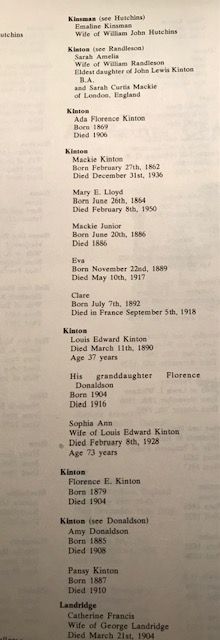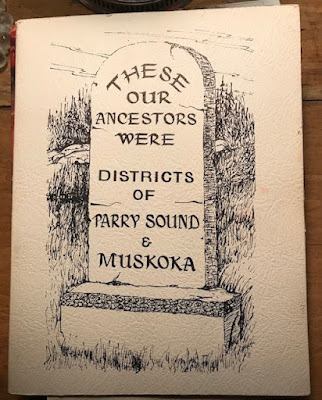 |
| Photo by Robert Currie |
Pioneer Muskoka Artist, Ada Florence Kinton, 1869-1906, is Buried in All Saints' Cemetery, Huntsville
When Ada Florence Kinton passed away, at the Huntsville home of her brother, she was only 37 years of age. Artist, art instructor, missionary, humanitarian, and passionate lover of life and family, Ada Kinton was ravaged by the labors of a dedicated existence, working to help others, whether students in her art classes, or street urchins starving on the city streets, or tending to those who were suffering from an exhaustion of faith; believing that there was no guardian angel, and no merciful God. She gave everything she had, and suffered from long term physical exhaustion, which eventually left her susceptible to more serious ailments. Who was Ada Florence Kinton and why does she deserve the historians' respect?
Quite a few years back, I was poking around in a used bookshop in Bracebridge, when I came upon a small hardcover book, amidst the typical pulp fiction and other motley texts that really should have been recycled, having no particular redeeming qualities in terms of content. Some manuscripts should have never been published, and the same may be said for some of my own work. But this little blue gem of text, entitled "Just One Blue Bonnet - Ada Florence Kinton," was well beyond exceptional, for a fellow like me who collects rare Muskoka-content books. This was a memorial edition to a well known Salvation Army missionary, artist and writer for their "War Cry Magazine," by the name of Ada Kinton, well known in the early village years of the present Town of Huntsville. The family name "Kinton" is still well known and respected in the chronicle of Huntsville history, and her art work from the 1880's, continues to hold relevance even in this new century.
But my fascination with Ada Kinton's biography has a lot to do with her journal, kept when she visited with her brothers, Mackie and Ed, two village businessmen, and wrote prolifically about what and how the community and neighborhood in which she was positioned, was moving ahead in these still pioneering years. She would remove herself from the Kinton homestead, to travel out into the woodlands around the ever expanding village, to capture on her sketch pads, the wildlife, flora and fauna that existed without compromise at this time in history. She not only composed illuminating diary entries about the woodland experience, but made sketches of many different situations in the forests, and described both the weather conditions, of the particular season, and as well, made notes about the woodland creatures, from chipmunks to birds, she witnessed on her hiatus periods enjoying the rural Canadian environment. She was one of the first artists and hobby diarists, to make these poignant observations, which certainly assist historians and ecologists, appreciate what it was like venturing back into the forests in the 1880's; especially in light of the fact the loggers weren't far behind Miss Kinton, in their own clear cut of the pine forests. She wrote at several points in her diary that she could clearly hear the woodsmen's saws, axes, and the thunderous falls of the tall pines off in this distance. She was determined to make good use of her time and opportunity, to make observations about the "before" in case, when she returned, her retreat had been reduced to stumps and sawdust.
What has, for long and long, attracted me to the life story of Ada Florence Kinton, was her unconditional love for humanity, her faith in God, and for me especially, her sincere interest in the District of Muskoka. Even though she had not spent a great deal of time in Huntsville, she chose, quite literally, to spend the rest of her life in that quiet, beautiful retreat, with her family at her side. When she returned from Church mission work in Australia, working for the Booth family, and then having spent time in the United States, her inability to regain her good health, demanded she be given time off in order to recuperate. She could have returned to England, where her family had dwelled until the death of her Mother and Father, and there were many other options with Salvation Army sanctuaries, Ada felt her only chance to survive her slowly degenerative illness, was to once again, inhale the clear, clean Muskoka air, from her family's dwelling place, overlooking the village. Inwardly, she knew the end was near when she arrived in Huntsville, but for some time later, she did seem to make a recovery, and was interested in resuming her art studies. But at only 37, she succumbed very peacefully, with family at her side, and with the sound of nature permeating her room to herald joyfully the final moments of a prosperous life.
As a companion to this part one post, of a larger tribute to the unsung Muskokan, I have included an original framed illustration of a companion dog and a poor child, in the nonchalant presence of our own little canine character, Muffin, (the snapshot taken by son Robert at his studio today). The illustration, likely used to illustrate a feature article in a late 1800's publication, is significant to the story of Ada Kinton, who began at an early age, showing particular concern for the welfare of city urchins in England, who were so greatly suffering from the indifference of the times, as far as social welfare is concerned. Her sister noted one instance, where Ada, in the "teeth of inclement winter weather," had come upon a trail of bloody footsteps in the snow, on a city street in which she was, at the time, traveling to get home. She assumed that the child who had made these grotesque footprints, had stepped on some sharp object down one of the slum laneways, injuring itself, and walking barefoot, and injured through the ankle deep snow that had recently fallen. One can imagine what these footprints would have looked like in a meandering trail in the low light of late afternoon. The footsteps ended at the hovel of a dwelling bordering one of these lanes where the homeless gathered around debris fires in order to stave off freezing to death. Ada Kinton never forgot these images, and it is said that it was a deciding reason why she devoted her life to helping others in greater need.
It is also known of Ada Kinton, than in the service of the Salvation Army, in Toronto, she tended soup kitchens for the destitute, and took a special interest in the terrible lives of newspaper boys, working for the city newspapers at the time. These were largely homeless urchins who needed the newspaper jobs to survive. And it is known that the newspapers weren't as interested in the welfare of the child labor force, but astutely aware of paper sales and circulation numbers. Many a news boy died in the pursuit of this miserable wage, either perishing by freezing to death, or starving. There is an account of Ada, while canvassing for the Salvation Army, and assisting the poor, found a news boy who had fallen down on the walkway on a busy section of city street. She watched as many passersby stepped over the half frozen child, not feeling any sense of responsibility to assist in any way such an parentless urchin. Ada, with her small physical presence, pushed the pedestrians aside, and pulled the child up from the cold ground, and lifted him up into her arms, while covering him with her overgarment, to provide a modest amount of warmth. The child was pulled into a safe portal, to get out of the bitter chill of winter, and was able to secure some hot beverage and blankets to help with recovery. The child was warmed, fed, and given another day of life, thanks to this kindly soul. And I can still feel her soulful warmth, after all these decades, whenever I stand at her graveside, in the picturesque cemetery in Huntsville.
Please join me over the next few days, to revisit this wonderful story and inspiring biography of Ada Florence Kinton; and I think you might also come to feel the pervasive warmth of a kindly old spirit, who loved the chatter of songbirds, and was a friend of all wild creatures of the forest, who were as curious about her, as she was about them.







No comments:
Post a Comment